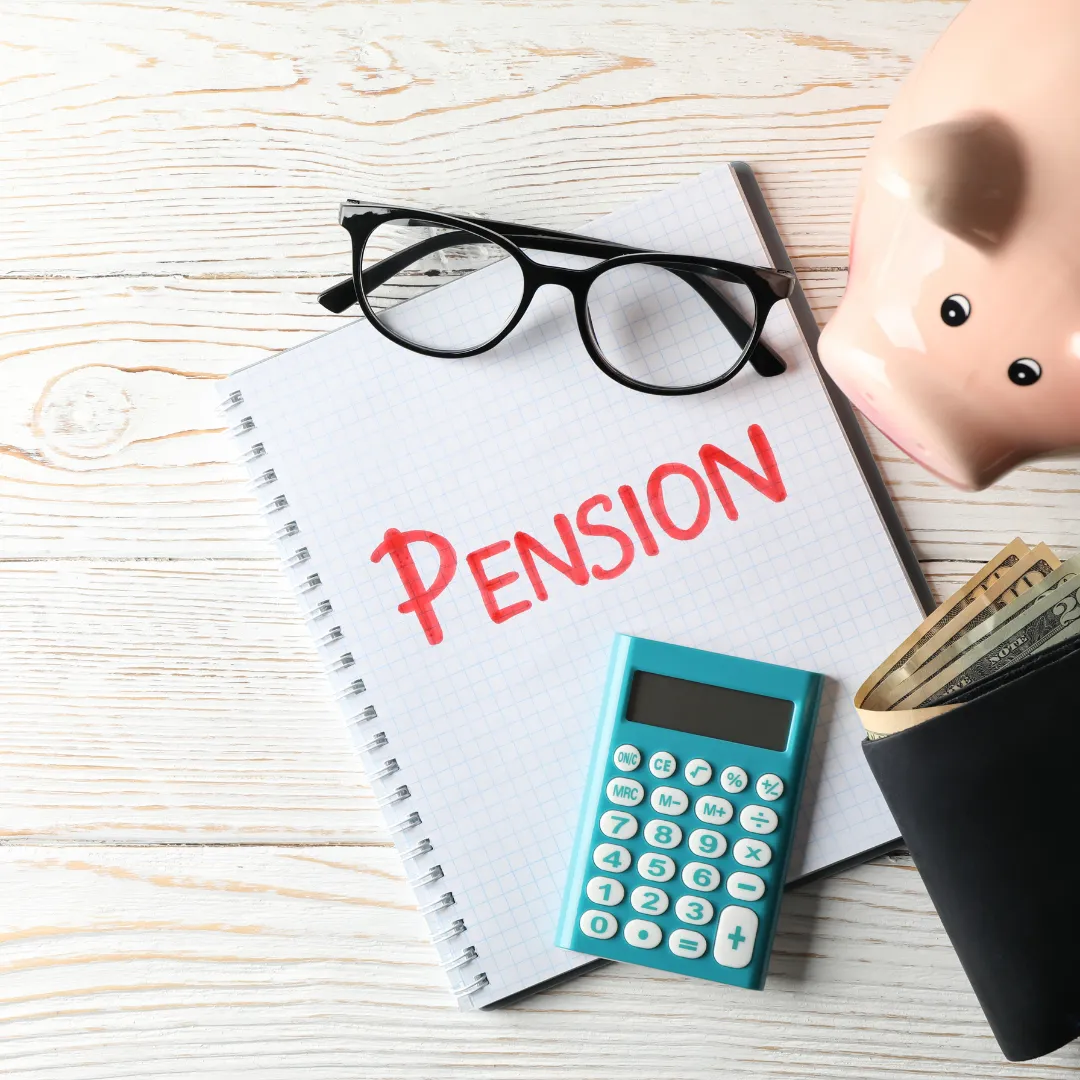Resource Articles

Top 10 Questions About Pensions: What You Need to Know for a Secure Retirement
Pensions have long been a cornerstone of retirement planning, offering a stable source of income after years of hard work. However, with the changing landscape of retirement benefits and the complexities involved in managing a pension, many people have questions about how pensions work and how they can be maximized for a secure retirement.
In this article, we’ll address the top 10 most common questions about pensions to help you better understand your benefits and how to plan for the future.
1. What is a pension, and how does it work?
A pension is a retirement plan that provides a regular, fixed income to employees after they retire. Pensions are typically funded by employers, although some plans may require employee contributions as well. The most common type of pension is the defined benefit (DB) plan, where the amount you receive in retirement is determined by a formula that considers your salary, years of service, and a multiplier.
Upon retirement, pension payments are usually made on a monthly basis for the rest of your life. Some pensions offer different payout options, such as a lump sum or a joint-and-survivor annuity, which continues to provide income to your spouse after your death.
2. What’s the difference between a defined benefit and a defined contribution pension plan?
The primary difference between a defined benefit (DB) and a defined contribution (DC) pension plan lies in who bears the investment risk and how the retirement benefit is calculated.
Defined Benefit (DB) Plan: In a DB plan, the employer is responsible for funding the pension and managing the investment risk. The retirement benefit is determined by a formula, typically based on your salary and years of service. The benefit is guaranteed for life, making it a predictable source of income.
Defined Contribution (DC) Plan: In a DC plan, such as a 401(k), both the employee and the employer contribute to an individual account. The employee bears the investment risk, and the retirement benefit depends on the account’s performance over time. The final amount available at retirement is not guaranteed and can vary based on market conditions.
3. How do I know if my pension is fully funded?
A fully funded pension plan has enough assets to cover all future liabilities, meaning it can meet its obligations to pay out benefits to current and future retirees. To determine if your pension is fully funded, you can request the plan’s funding status from your employer or plan administrator.
In the U.S., pension plans are required to file annual reports with the Department of Labor, which include information on the plan’s funding status. If a plan is underfunded, it means that it does not currently have enough assets to cover its obligations, which could pose a risk to your future benefits.
4. Can my pension benefits be reduced?
Yes, in certain situations, pension benefits can be reduced. This is more likely to happen if your pension plan is underfunded and the plan sponsor (typically your employer) cannot meet its obligations. In extreme cases, if a private-sector pension plan fails, the Pension Benefit Guaranty Corporation (PBGC) may step in to provide some level of benefits, but these may be lower than what was originally promised.
For public-sector pensions, reductions can occur if the government entity sponsoring the plan faces significant financial difficulties, although this is generally less common and often involves legal challenges.
5. What happens to my pension if I change jobs?
If you have a defined benefit pension plan and change jobs, what happens to your pension benefits depends on whether or not you are vested. Vesting refers to the amount of time you must work for your employer before you have a right to your pension benefits.
If you are vested: You will typically be entitled to a pension benefit when you reach retirement age, even if you no longer work for that employer. The benefit will be based on the years of service and salary you had when you left the job.
If you are not vested: You may not be entitled to any pension benefits from that employer. Some plans have a “cliff vesting” schedule, where you gain full vesting rights after a certain period, while others have a gradual vesting schedule.
Defined contribution plans, like 401(k)s, are generally more portable. You can often roll over your balance into an IRA or your new employer’s plan without penalty.
6. Should I take a lump sum or monthly payments from my pension?
When you retire, some pension plans offer a choice between receiving a lump sum payment or monthly payments (also known as an annuity). The decision depends on several factors, including your financial situation, life expectancy, and risk tolerance.
Lump Sum: Taking a lump sum gives you control over the money, allowing you to invest or spend it as you see fit. However, it also transfers the risk of managing the money to you. If you’re confident in your ability to manage and invest the funds, this option may be attractive.
Monthly Payments: An annuity provides a guaranteed income for life, which can be particularly valuable if you’re concerned about outliving your savings. It’s a more conservative choice, providing financial security without requiring you to manage investments.
Consider speaking with a financial advisor to evaluate your options and determine which choice aligns best with your retirement goals.
7. How is my pension taxed?
Pension income is generally subject to federal income tax and, in some cases, state income tax. The amount you owe will depend on the total income you receive during retirement and your tax bracket.
Federal Taxes: Most pension payments are considered taxable income, and you’ll need to report them on your federal tax return. The amount withheld for taxes from your pension payments can be adjusted based on your preferences.
State Taxes: Some states do not tax pension income, while others do. It’s important to understand the tax laws in your state and how they might affect your retirement income.
If you take a lump sum, the entire amount may be taxable in the year you receive it, which could push you into a higher tax bracket. Rolling over a lump sum into an IRA can help you avoid immediate taxation.
8. What happens to my pension when I die?
The fate of your pension benefits after your death depends on the type of pension plan and the payout option you selected at retirement.
Single-Life Annuity: If you chose a single-life annuity, payments will stop upon your death, and no further benefits will be paid to your beneficiaries.
Joint-and-Survivor Annuity: This option provides a lower monthly payment but continues to pay a portion (usually 50-100%) of your benefit to your spouse or another designated beneficiary after your death.
Lump Sum: If you took a lump sum and invested it, the remaining balance would be passed on to your beneficiaries as part of your estate.
It’s crucial to review your pension plan’s specific rules and discuss your options with a financial advisor to ensure your loved ones are protected.
9. Can I lose my pension if my company goes bankrupt?
If your company goes bankrupt, what happens to your pension depends on the type of plan you have:
Defined Benefit Pension: In the case of private-sector pensions, the PBGC may step in to take over the plan and pay out benefits, but these may be lower than what you were originally promised, especially if your benefit exceeds the PBGC’s maximum guarantee limit.
Defined Contribution Pension: For defined contribution plans like a 401(k), your funds are held in an individual account, and they are generally safe from creditors, even if the company goes bankrupt.
Public-sector pensions are generally not covered by the PBGC, so outcomes can vary depending on the specific circumstances and legal protections in place.
10. How do I maximize my pension benefits?
Maximizing your pension benefits involves a combination of understanding your plan, making informed decisions, and planning for the future. Here are some strategies to consider:
Stay Longer: The longer you stay with your employer, the higher your pension benefit is likely to be. This is particularly true if your plan’s formula heavily weighs years of service.
Choose the Right Payout Option: Carefully consider the payout options available to you at retirement. While a single-life annuity offers the highest monthly payment, a joint-and-survivor annuity provides protection for your spouse.
Understand Inflation Adjustments: Some pensions include cost-of-living adjustments (COLAs), which help maintain your purchasing power over time. If your pension does not include COLAs, consider how inflation might erode your income and plan accordingly.
Coordinate with Other Retirement Income: Integrate your pension into a broader retirement income strategy that includes Social Security, personal savings, and investments. Diversifying your income sources can provide greater financial security.
Consult a Financial Advisor: A financial advisor can help you evaluate your pension benefits and develop a retirement strategy that maximizes your income while managing risk.
Conclusion:
Pensions remain a crucial part of retirement planning, offering a reliable source of income for many retirees. However, understanding the complexities of your pension plan, making informed decisions about your benefits, and integrating your pension into a comprehensive retirement strategy are essential for maximizing your financial security in retirement.
By addressing the most common questions about pensions, this article aims to provide clarity and guidance as you navigate your retirement planning journey. With careful planning and a clear understanding of your options, you can make the most of your pension benefits and enjoy a secure and fulfilling retirement.

Trusted Industry Experts
Getting through retirement is no small feat. We've trained experts to serve you in every way from your health to your wealth.

Locations
Resources
Shortcuts
Privacy Policy
Terms of Use
Accessibility
© 2026 Retirement Fundamentals. All rights reserved.
